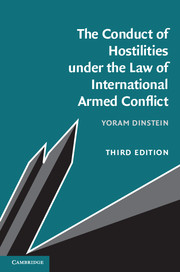Book contents
- Frontmatter
- Contents
- Introduction to the Third Edition
- Preface
- Table of cases
- Table of treaties
- List of abbreviations
- 1 The general framework
- 2 Lawful combatancy
- 3 Prohibited weapons
- 4 Lawful targets of attack
- 5 Protection from attack of civilians and civilian objects
- 6 Measures of special protection from attack
- 7 Protection of the environment
- 8 Specific methods of warfare
- 9 War crimes, orders, command responsibility and defences
- General conclusions
- Index of persons
- Index of subjects
9 - War crimes, orders, command responsibility and defences
Published online by Cambridge University Press: 05 April 2016
- Frontmatter
- Contents
- Introduction to the Third Edition
- Preface
- Table of cases
- Table of treaties
- List of abbreviations
- 1 The general framework
- 2 Lawful combatancy
- 3 Prohibited weapons
- 4 Lawful targets of attack
- 5 Protection from attack of civilians and civilian objects
- 6 Measures of special protection from attack
- 7 Protection of the environment
- 8 Specific methods of warfare
- 9 War crimes, orders, command responsibility and defences
- General conclusions
- Index of persons
- Index of subjects
Summary
The definition of war crimes
824. War crimes constitute acts contrary to LOIAC giving rise to penal accountability of the individuals who perpetrated the proscribed acts. In the past, it was frequently contended that ‘[e]very violation of the law of war is a war crime’. But such assertions have never elicited support in actual State practice. As pointed out already by H. Lauterpacht, ‘textbook writers and, occasionally, military manuals and official pronouncements have erred on the side of comprehensiveness’ in making ‘no attempt to distinguish between violations of the rules of warfare and war crimes’. It is currently clear that only select, serious, violations of LOIAC are stigmatized as war crimes.
825. There is no single binding definition of war crimes. The locus classicus for such a definition used to be Article 6(b) of the 1945 London Charter of the IMT, which reads:
War crimes: namely, violations of the laws or customs of war. Such violations shall include, but not be limited to, murder, ill-treatment or deportation to slave labour or for any other purpose of civilian population of or in occupied territory, murder or ill-treatment of prisoners of war or persons on the seas, killing of hostages, plunder of public or private property, wanton destruction of cities, towns or villages, or devastation not justified by military necessity.
In the Nuremberg Judgment, the IMT said:
With respect to War Crimes,…, the crimes defined by Article 6, Section (b), of the Charter were already recognized as War Crimes under international law. They were covered by Articles 46, 50, 52, and 56 of the Hague Convention of 1907, and Articles 2, 3, 4, 46, and 51 of the Geneva Convention of 1929. That violation of these provisions constituted crimes for which the guilty individuals were punishable is too well settled to admit of argument.
826. It is manifest that the definition of war crimes in Article 6(b) is not exhaustive. In the words of the IMT:
The Hague Convention of 1907 prohibited resort to certain methods of waging war. These included the inhumane treatment of prisoners, the employment of poisoned weapons, the improper use of flags of truce, and similar matters.
- Type
- Chapter
- Information
- Publisher: Cambridge University PressPrint publication year: 2016



